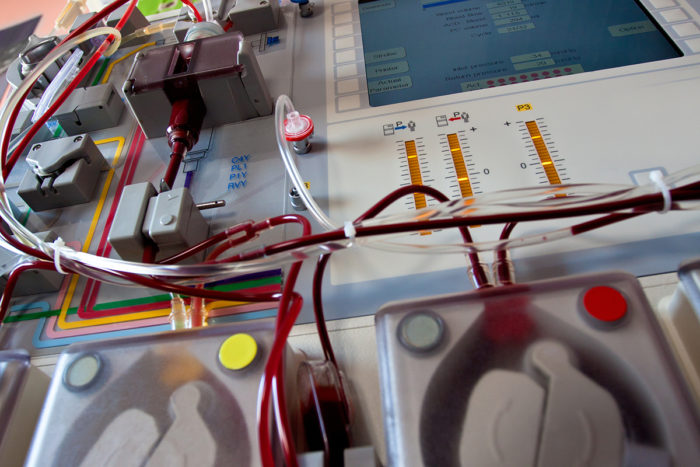Experimental arthritis drug prevents stem cell transplant complication
Drug fights graft-versus-host-disease in mice
 Getty Images
Getty ImagesAn apheresis machine prepares donor blood, a step in stem cell transplantation — a common treatment for leukemia and other blood cancers. A new study at Washington University School of Medicine in St. Louis shows an investigational drug prevents graft-versus-host disease, a dangerous side effect of stem cell transplantation.
An investigational drug in clinical trials for rheumatoid arthritis prevents a common, life-threatening side effect of stem cell transplants, new research from Washington University School of Medicine in St. Louis shows. Studying mice, the researchers found the drug prevented what’s known as graft-versus-host disease, a debilitating, sometimes lethal condition that develops when transplanted stem cells attack the body’s own organs or tissues.
About half of patients receiving donor stem cells develop graft-versus-host disease, which can linger for months or years after their transplants. In some cases, patients die not from their cancer but from the complication itself. Current treatments are not effective.
The study is online in the journal Leukemia.
In past work, this research team defined the role of molecules called JAK1/2 kinases and their signaling pathways in immune cell activation and graft-vs-host disease. In the new study, these same researchers evaluated ruxolitinib and baricitinib, and found baricitinib to be the superior of the two drugs in reducing and preventing graft-versus-host-disease in mice. Both drugs belong to a class of pharmaceuticals called JAK inhibitors that are known for dialing down inflammation.
“Transplanted donor stem cells — and more specifically, the T cells in the donor stem cell product — are particularly good at fighting off leukemia, but these cells can go haywire, unfortunately, and attack the patient’s healthy tissues, causing graft-versus-host disease,” said senior author John F. DiPersio, MD, PhD, the Virginia E. and Sam J. Golman Professor of Medicine in Oncology. “The typical ways we can reduce the effects of the disease also tend to weaken the T cells’ ability to attack the cancer. We’re looking for a treatment strategy that stops the disease without shutting down T cells’ assault on the cancer.”
Surprisingly, baricitinib did more than shut down graft-versus-host disease. It actually boosted the ability of the donor T cells to fight the cancer.
“We don’t know yet exactly how this happens, but we’re working to understand it,” said first author Jaebok Choi, PhD, an assistant professor of medicine. “We think at least part of the explanation is the drug strips the leukemia cells of their immune defenses, making them more vulnerable to attack by the donor T cells. At the same time, the drug also stops the donor T cells from being able to make their way to important healthy tissues, such as the skin, liver and gastrointestinal tract, where they often do the most damage.”
In other words, the drug appears to stop graft-versus-host disease by simply keeping the donor T cells circulating in the bloodstream, away from vital organs. Simultaneously, the drug makes the leukemia cells more vulnerable to immune attack from the donor T cells, which are now mostly confined to the bloodstream, where the cancer is.
The drug also appeared to boost levels of specific immune cells that put the brakes on a runaway immune response that can make graft-versus-host disease worse. These apparently independent effects are specific to baricitinib and may explain why other JAK inhibitors did not work as well, according to DiPersio, who is also deputy director of Siteman Cancer Center at Barnes-Jewish Hospital and Washington University School of Medicine.
The researchers emphasized the finding that the drug not only prevented graft-versus-host disease from developing in the mice but reversed established disease, suggesting possible options for patients already affected by it.
“We were surprised to achieve 100 percent survival of mice with the most severe model of graft-versus-host disease,” Choi said. “We are now studying the multi-pronged ways this drug behaves in an effort to develop an even better version for eventual use in clinical trials.”
Because of the drug’s broad effectiveness in preventing inflammatory disorders, DiPersio said he and his colleagues are beginning to explore whether it could be used to prevent organ rejection in patients undergoing solid organ transplantation. Such a strategy might reduce the need to give these patients powerful immune-suppressing drugs that increase the risk of infection.






